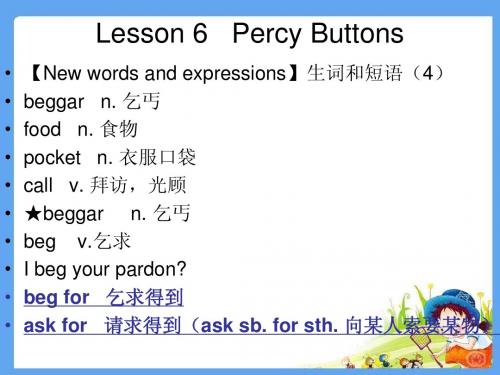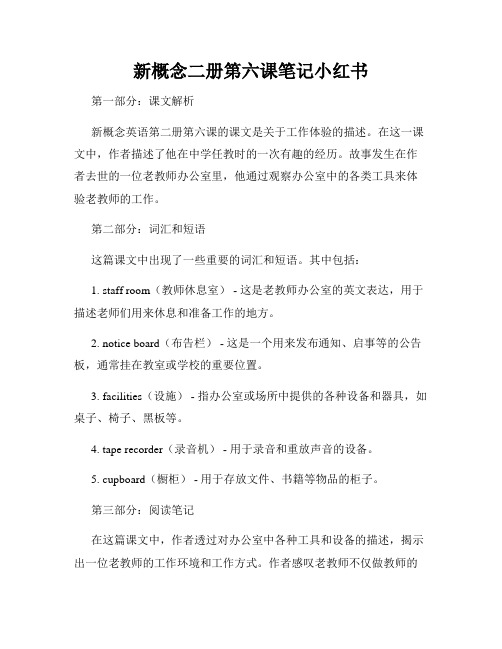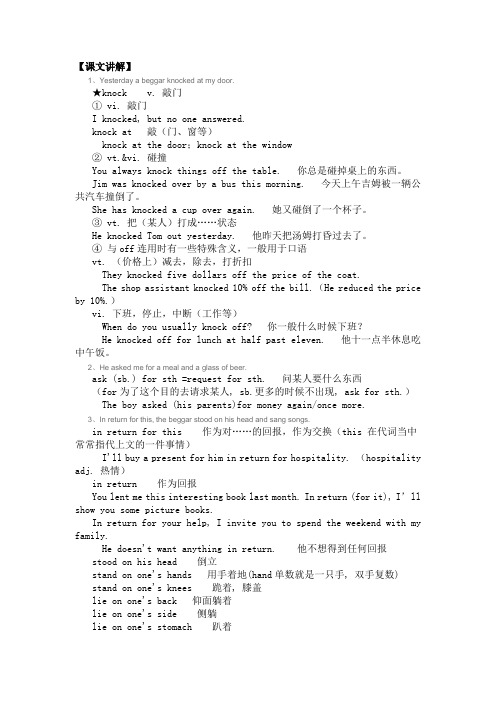新概念英语第二册第六课学习笔记
新概念第二册PPT教学笔记lesson 6

• knock v. 敲 knock at 敲门 knock off 下班 • knock off 打折,把……撞倒.knock out 打晕 • He did not know how to fight, but he knocked the boxer out.
• You always knock things off the tabus this morning. • She has knocked a cup over again.
• 2) vt. 把(某人)打成……状态 • He knocked Tom out yesterday. 他昨天把汤姆 打昏过去了。 • 3)与off连用时有一些特殊含义 • vt. (价格上)减去,除去,打折扣 • They knocked five dollars off the price of the coat. • The shop assistant knocked 10% off the bill. • vi. 下班,停止,中断(工作等) • When do you usually knock off? • He knocked off for lunch at half past eleven.
• 2、He asked me for a meal and a glass of beer. • ask (sb.) for sth =request for sth. 向某人要…
• The boy asked (his parents) for money again/ once more.
• 3、In return for this, the beggar stood on his head and sang songs. • in return for this 作为对……的回报,作为交换 (this 指代上文的一件事情) • stood on his head 倒立 • stand on one‘s hands 用手着地 • stand on one's knees 跪着, 膝盖 • lie on one's back 仰面躺着 • lie on one's side 侧躺 • lie on one's stomach 趴着
新概念英语第二册第6课重点语法句型

第6课的内容: ⼀、重要句型或语法 1、冠词的⽤法 1)不定冠词a/an,如:a pen, an egg 2)定冠词the,如:A dog is barking at me. The dog is black and white. 3)零冠词,即不⽤冠词的情况,如⼈名和地名前⾯,如:John lives in London. 2、短语动词的⽤法 短语动词指的是后⾯跟上介词或副词后、意思会发⽣变化的动词。
如: 1)I put your book on the shelf. / I put on my hat and left the house. 2)It was very hot, so I took off my coat. / Will you look after the children for me please? ⼆、课⽂主要语⾔点 I have just moved to a house in Bridge Street. 1)注意move to表⽰搬到什么地⽅,move into表⽰搬进什么地⽅。
2)注意地名Bridge Street⾥的每个单词的⾸字母都要⼤写。
Yesterday a beggar knocked at my door. 1)beggar来源于beg(请求,祈求),表乞丐。
2)knock at表⽰敲打。
He asked me for a meal and a glass of beer. ask sb. for sth.,表⽰向某⼈提出请求或要求。
注意ask sb.表⽰询问某⼈。
In return for this, the beggar stood on his head and sang songs. 1)in return for sth.,作为对...的回报。
2)stand on one's head,表⽰倒⽴。
He ate the food and drank the beer. 1)本句为由and连接的并列句,⽽且前后结构完全⼀样,使得整句话颇有节奏感。
新概念英语第二册第6课学习笔记

Lesson 6 Percy Buttons 珀西.巴顿【New words and expressions】生词和短语(4)beggar n.乞丐气 food n.食物pocket n.衣服口袋 call v.拜访,光顾☆beggar n.乞丐 beg v.乞求行乞重读闭音节, 需双写g。
类似的词有begin,run,swim,big,rob. beg(for)sth from sb 乞求…, 向…行乞ask sb for sth:请求得到某物beg sb for sth 恳求, 乞求(以谦虚的姿态要求)beg sb (not) to do sth 恳求某人(不要)做某事beg somebody off 为某人求情I beg your pardon?(1)I’m sorry./Excuse me.对不起, 请原谅!(2)Please repeat it./Pardon.请再说一遍。
☆food n.(1)(U)食物通常是不可数名词a lot of food(C)作为特种食品时, 可看做可数名词Baby foods 婴儿食品 health foods 健康食品Frozen foods 冷冻食品 breakfast foods 早餐a favorite foods 最喜欢的一种食物(3)food chain 食物链★pocket n.衣服口袋 ,衣袋inner pocket 内口袋; jacket pocket 夹克的口袋;coat pocket 大衣口袋 pocket book 袖珍书;pocket dictionary 袖珍词典 pocket money (小孩的)零花钱change零钱 get exact [ɪg'zækt]确切的,精确的change 准备好正确的零花钱beer money (男人的)零花钱(18世纪, 在小说里有时能见到女人的零花钱是针线钱。
但是随着时代的进步, 剩下的money都归女人管, 所以女人无零花钱。
新概念英语第二册笔记-第06课

单词学习beggar n. 乞丐beg [beɡ] v. 乞求,行乞重读闭音节,需双写g。
类似的词有:begin, dig, run, swim, drag, big, roba begging letter 求援信beg sth from sb 乞求…..向……行乞= beg for sth from sbeg. Percy Buttons begged for a meal and a glass of bear from me.帕西·巴顿斯向我讨要一顿饭和一杯啤酒相当于:Percy Buttons asked me for a meal and a glass of bear.ask sb for sth 向某人要求某物beg sth from sb 〔更谦卑〕向某人要求某物eg. My little brother asks me for lucky money every year.我的弟弟每年都向我要压岁钱。
eg. The girl asked her mother for that beautiful skirt. 那个小女孩向她妈妈要那条漂亮的裙子。
beg sb for sth 恳求,祈求〔以谦虚的姿态要求〕eg. Set him free, I beg you! 我求求你,饶了他吧!beg sb not todo sth 祈求某人不做某事beg sb to do sth 祈求某人去做某事eg. They begged us not to punish them. 他们祈求我们不要惩罚他们。
eg. He knew that he had burt her and begged her to forgive him.他知道他伤害了她,恳求她原谅。
I beg your pardon!1) I'm sorry. / Excuse me. 对不起,请原谅。
2) Please repeat that./ Pardon 请再说一遍beg somebody off 为某人求情beg a favor of somebody 恳求别人帮助v + er/or/ar 可以表达"人"的概念work-worker 工人; sail-sailor 水手; beg-beggar 乞丐eg. Beggars can't be choosers. 饥不择食〔谚语〕beggar 家伙,〔口语〕有戏虐之意eg. You lucky beggar. 你这家伙真幸运!food n.1) [u] 食物,通常为不可数名词eg. We can't live for long without food and water. 没有食物和水我们活不长。
新概念二册第六课笔记小红书

新概念二册第六课笔记小红书第一部分:课文解析新概念英语第二册第六课的课文是关于工作体验的描述。
在这一课文中,作者描述了他在中学任教时的一次有趣的经历。
故事发生在作者去世的一位老教师办公室里,他通过观察办公室中的各类工具来体验老教师的工作。
第二部分:词汇和短语这篇课文中出现了一些重要的词汇和短语。
其中包括:1. staff room(教师休息室) - 这是老教师办公室的英文表达,用于描述老师们用来休息和准备工作的地方。
2. notice board(布告栏) - 这是一个用来发布通知、启事等的公告板,通常挂在教室或学校的重要位置。
3. facilities(设施) - 指办公室或场所中提供的各种设备和器具,如桌子、椅子、黑板等。
4. tape recorder(录音机) - 用于录音和重放声音的设备。
5. cupboard(橱柜) - 用于存放文件、书籍等物品的柜子。
第三部分:阅读笔记在这篇课文中,作者透过对办公室中各种工具和设备的描述,揭示出一位老教师的工作环境和工作方式。
作者感叹老教师不仅做教师的工作,还积极参与学校的各种活动,并担任多项职务。
通过观察办公室的布局和设施,作者意识到教师的工作并不轻松,并需要处理各种事务。
此外,他还强调了老教师对教育事业所做的贡献以及他对学生的关怀和关注。
第四部分:个人观点我对这篇课文的理解是,教师职业是一项具有挑战性和责任感的工作。
通过课文中描述的老教师的工作环境和工作方式,我更加理解了教师们的辛勤付出和对学生的关心。
同时,我也认识到教育并不仅仅是课堂上的传授知识,还需要老师们参与到学校的各项活动中,为学生提供更全面的教育和支持。
第五部分:总结通过这一课文的学习,我对教师职业有了更深入的理解。
教师们所面临的挑战和工作压力不容忽视,他们需要同时处理好多个任务,并关心每一个学生的发展。
我对教师们的辛勤付出表示由衷的敬意,并希望将来能为教育事业做出自己的贡献。
以上是对新概念二册第六课的课文《笔记小红书》的解析和个人观点。
新概念二笔记 6课

新概念二笔记第6课1. move to+ 地点搬到某地move in/out 搬进,搬出(不能接地点)move into/out of +地点2. beggar n. 乞丐beg v. 请求,乞求,乞讨beg for sth. 祈求得到......beg sth. from sb. 向某人讨要某物beg sb. to do sth.beg sb. not to do sth.I beg your pardon.3. knockknock at 敲knock at the door/windowknock over 撞倒The car knocked the boy over.knock out 击倒、打昏The policeman knocked the thief out.knock off 休息,下班; 打折扣; 碰掉It’s past six, let’s knock off.The shop assistant knock 10% off the bill.I knocked the vase off and broke it.4. ask for sth. 索要…ask sb.for sth. 向某人索要某物I asked my father for some money.ask to do sth.ask sb. to do sth.5. in return 作为回报in return for … 作为对…的报答In return for your help, I invite you to spend the weekend with my family.6. stand on one’s head 倒立The monkey stood on its head to get the banana.7. food 食物(U)We can’t live for long without food and water.mental food 精神食粮(C) 表示特殊种类的食品health foods baby foods8. go away 走开There was no answer to my knock, so went away.9. tell sb. about sth. 向某人讲述有关某事的情况Tell me something about your job.10. call at + sp. 拜访某地call on + sb. 拜访某人I shall call on that old man tomorrow.The beggar calls at every house once a month.call out 大声喊叫call in 召集call back 回电话call up=ring up 给某人打电话11. once a month 每月一次I go to visit my grandfather once a month.twice 两次three times 三次表示三次或以上时用“数词+ times”对频率来提问时要用how often12. 浅谈a /the /some 的用法(1). a 表示一个,后接可数名词单数some 表示一些,后接可数名词复数或不可数名词(2). a 通常用于第一次提到某个事物时使用the前面提到过的事物,再次出现时用the来修饰(3). 当名词有介词短语修饰的时候要用the(4). 冠词不能用于人名、地名、国名的前面13. Special difficulties短语动词:put ...on... 把…放在…put on 穿上take off 脱掉/起飞look at 看look for 寻找look after 照看,照顾14. 冠词的用法冠词的用法:不定冠词a的用法1. 在叙述时,第一次提到某人或某事物前,第二次再提到要用theThis is a book. The book is mine.2. 泛指某人或某物的某一类别,以区别于其他种类。
新概念二Lesson 6 知识点整理

定冠词的位置:
1、当定冠词与all,half,both,double等词连用修饰名词时,定冠词放在这些词之后
Look, all the books are here.瞧,所有的书都在这。
Both the boys are from Class 1,Grade 2.这两个男孩都是二年级一班的。
2、当定冠词与表示的倍数、分数的词连用时,需要放在这些词之后
The bed is three times the size of that one.这张床是那张床的三倍大。
That one.这根绳子的长度是那根的三分之一。
零冠词的用法:
1、不可数名词和复数名词表泛指时前面用零冠词
Man can’t live without water.没有水人类就不能生存。
3.He asked me for a meal and a glass of beer.
4.In return for this, the beggar stood on his head…
5.He calls at every house in the street once a month…
重点语法
冠词
不定冠词a/an的用法:
1、在叙述用于第一次提到的某人或某物之前。
This is a book.这是一本书。
2、泛指人或事物的某一类别,以区别于其他种类
A plane is a machine that can fly.飞机是一种能飞的飞机。
3、泛指某人或某物
A girl is waiting for you.一个女孩在等你。
第二册新概念lesson6随堂笔记

【课文讲解】1、Yesterday a beggar knocked at my door.★knock v. 敲门① vi. 敲门I knocked, but no one answered.knock at 敲(门、窗等)knock at the door;knock at the window② vt.&vi. 碰撞You always knock things off the table. 你总是碰掉桌上的东西。
Jim was knocked over by a bus this morning. 今天上午吉姆被一辆公共汽车撞倒了。
She has knocked a cup over again. 她又碰倒了一个杯子。
③ vt. 把(某人)打成……状态He knocked Tom out yesterday. 他昨天把汤姆打昏过去了。
④ 与off连用时有一些特殊含义,一般用于口语vt. (价格上)减去,除去,打折扣They knocked five dollars off the price of the coat.The shop assistant knocked 10% off the bill.(He reduced the price by 10%.)vi. 下班,停止,中断(工作等)When do you usually knock off? 你一般什么时候下班?He knocked off for lunch at half past eleven. 他十一点半休息吃中午饭。
2、He asked me for a meal and a glass of beer.ask (sb.) for sth =request for sth. 问某人要什么东西(for为了这个目的去请求某人, sb.更多的时候不出现, ask for sth.)The boy asked (his parents)for money again/once more.3、In return for this, the beggar stood on his head and sang songs.in return for this 作为对……的回报,作为交换(this 在代词当中常常指代上文的一件事情)I'll buy a present for him in return for hospitality. (hospitality adj. 热情)in return 作为回报You lent me this interesting book last month. In return (for it), I’ll show you some picture books.In return for your help, I invite you to spend the weekend with my family.He doesn't want anything in return. 他不想得到任何回报stood on his head 倒立stand on one's hands 用手着地(hand单数就是一只手, 双手复数)stand on one's knees 跪着, 膝盖lie on one's back 仰面躺着lie on one's side 侧躺lie on one's stomach 趴着4、Later a neighbour told me about him.介词about可以和一些动词连用,以表示“关于……(的)”、“涉及……(的)”Please tell me about the accident.tell sb. about sth. 告诉某人某事(about关于, 通过其他事自己得出的结论)tell you about himtell you about the word 解释这个单词的意思tell sb. sth. 告诉某人某件事(把事情直接告诉)tell you the newstell you the word 直接告诉这个单词5、Everybody knows him.everybody作为主语一定作单数看待, 属于不定代词所有的不定代词作为主语一律为单数看待 : somebody,anybody,everything 等6、He calls at every house in the street once a month and always asks for a meal and a glass of beer.calls at 光顾,拜访in the street(英国)/on the street(美国)once a month 一个月一次, 单位表达方式once adj. 表示每……一次(表示频率时后面直接加表示时间的名词), 计量单位“/” (每……)five kilometers an hourHe goes back to the South once a year.【知识点讲解】1 knock [动词] ①敲,打(某物)例句:He knocked several times on the window.他敲了几下窗。
- 1、下载文档前请自行甄别文档内容的完整性,平台不提供额外的编辑、内容补充、找答案等附加服务。
- 2、"仅部分预览"的文档,不可在线预览部分如存在完整性等问题,可反馈申请退款(可完整预览的文档不适用该条件!)。
- 3、如文档侵犯您的权益,请联系客服反馈,我们会尽快为您处理(人工客服工作时间:9:00-18:30)。
Lesson 6 Percy Buttons 珀西.巴顿【New words and expressions】生词和短语(4)beggar n. 乞丐气 food n. 食物pocket n. 衣服口袋 call v. 拜访,光顾★beggar n. 乞丐 beg v.乞求 I beg your pardon?beg for 乞求得到 ask for 请求得到(ask sb. for sth. 向某人索要某物)★food n. 食物(不可数) a lot of food★pocket n. 衣服口袋inner pocket 内口袋;jacket pocket 夹克的口袋;coat pocket 大衣口袋pocket book 袖珍书;pocket dictionary 袖珍词典pocket pick 车上的小偷 pocket money (小孩的)零花钱change零钱 get exact [ɪg'zækt]确切的,精确的change 准备好正确的零花钱beer money (男人的)零花钱★call v. 拜访, 光顾① vt.&vi.叫,喊 I heard someone calling. call out =shout 大声喊② vt. 呼唤,召唤 Lucy is sick生病. Please call a doctor.③ vi. 访问,拜访;(车、船等)停靠 Amy called (at our house) yesterday. The train calls at large stations only. 这列火车只停大站。
call on sb. 拜访某人 I will call on you. 我要去你家。
call at+地点=visit someplace 拜访某地I will call at your home. 我要去你家。
④ vt.&vi. 打电话call sb =call up sb. 给某人打电话 call back 回某人电话Can you take a message for me? =Can you tell him to call back?call in sb. 招集和邀请某人For the project计划;规划, the government called in a lot of experts. expert 专家;能手【Text】I have just moved to a house in Bridge Street. Yesterday a beggar knocked at my door. He asked me for a meal and a glass of beer. In return for this, the beggar stood on his head and sang songs. I gave him a meal. He ate the food and drank the beer. Then he put a piece of cheese in his pocket and went away. Later a neighbour told me about him. Everybody knows him. His name is Percy Buttons. He calls at every house in the street once a month and always asks for a meal and a glass of beer. 参考译文:我刚刚搬进了大桥街的一所房子. 昨天一个乞丐来敲我的门, 问我要一顿饭和一杯啤酒. 作为回报, 那乞丐头顶地倒立起来, 嘴里还唱着歌. 我给了他一顿饭. 他把食物吃完, 又喝了酒. 然后把一块乳酪装进衣袋里走了. 后来, 一位邻居告诉了我他的情况. 大家都认识他, 他叫珀西.巴顿斯. 他每月对这条街上的每户人家光顾一次, 总是请求给他一顿饭和一杯啤酒. 【课文讲解】1、Yesterday a beggar knocked at my door.★knock v. 敲门① vi. 敲门 I knocked, but no one answered.knock at 敲(门、窗等) knock at the door;knock at the window② vt.&vi. 碰撞You always knock things off the table. 你总是碰掉桌上的东西。
Jim was knocked over by a bus this morning. 今天上午吉姆被一辆公共汽车撞倒了。
She has knocked a cup over again. 她又碰倒了一个杯子。
③ vt. 把(某人)打成……状态He knocked Tom out yesterday. 他昨天把汤姆打昏过去了。
④与off连用时有一些特殊含义,一般用于口语vt. (价格上)减去,除去,打折扣They knocked five dollars off the price of the coat.The shop assistant knocked 10% off the bill.(He reduced the price by 10%.)vi. 下班,停止,中断(工作等)When do you usually knock off? 你一般什么时候下班?He knocked off for lunch at half past eleven.他十一点半休息吃中午饭。
2、He asked me for a meal and a glass of beer.ask (sb.) for sth =request for sth. 问某人要什么东西(for 为了这个目的去请求某人, sb.更多的时候不出现, ask for sth.)The boy asked (his parents)for money again/once more.3、In return for this, the beggar stood on his head and sang songs. in return for this 作为对……的回报,作为交换(this 在代词当中常常指代上文的一件事情)I'll buy a present for him in return for hospitality. (hospitality adj. 热情)in return 作为回报 You lent me this interesting book last month. In return (for it), I’ll show you some picture books.In return for your help, I invite you to spend the weekend with my family.He doesn't want anything in return. 他不想得到任何回报stood on his head 倒立stand on one's hands 用手着地(hand单数就是一只手, 双手复数)stand on one's knees 跪着, 膝盖 lie on one's back 仰面躺着lie on one's side 侧躺 lie on one's stomach ['stʌmək]胃、肚子趴着4、Later a neighbour told me about him.介词about 可以和一些动词连用,以表示“关于……(的)”、“涉及……(的)。
” Please tell me about the accident ['æksədənt]事故;灾祸. tell sb. about sth. 告诉某人某事(about关于, 通过其他事自己得出的结论)tell you about him tell you about the word 解释这个单词的意思tell sb. sth. 告诉某人某件事(把事情直接告诉)tell you the news tell you the word 直接告诉这个单词5、Everybody knows him.everybody作为主语一定作单数看待, 属于不定代词。
所有的不定代词作为主语一律为单数看待: somebody,anybody,everything等。
6、He calls at every house in the street once a month and always asks for a meal and a glass of beer.calls at 光顾,拜访 in the street(英国)/on the street(美国)once a month 一个月一次, 单位表达方式once adj. 表示每……一次(表示频率时后面直接加表示时间的名词), 计量单位“/”(每……)。
five kilometers an hourHe goes back to the South once a year.【Key structures】A, The and Some当表示不确定的某个人或物时,用不定冠词a/an(单数, 可数名词);当表示不可数的名词时,则需要由不定冠词加量词组成词组。
在表示一种笼统概念(某某一类/一种东西)的陈述句中可以省略a和someA tiger is a dangerous animal ['ænəm!]. -ous表示"有...特质的","多...的" Tigers are dangerous. Salt盐is necessary ['nɛsə,sɛrɪ]for/to us all. 表示某个确定的人或事物或者上文已提到过的人或事物,则要用定冠词the (有时相当于this/that/these/those),可数名词单/复数或不可数名词均可。
在姓名、地名、国名(非复合词)以及月份、星期等前面不加任何冠词。
a和the的区别:a 是泛指, a man;特指, the man.在文章当中第一次出现名词的时候往往用a和an修饰, 第二次出现的时候用theA man is walking towards me. The man is carrying a parcel. The parcel is full of meat.I have just drunk a glass of milk. Milk is very refreshing提神的;清凉的.I ate an apple. Apples are delicious [dɪ'lɪʃəs]美味的;香喷喷的.She always buys flour, sugar and tea at the grocer's.一般姓名前一般不能加冠词,表示“某某一类人当中, 具有这种特征当中的一个”,加不定冠词a. a Mr. Zhang 张先生这类人【Special Difficulties】短语动词:某些动词的后面加上介词或副词以后就会改变词义, 这种新的组合称作短语动词put v. 放put on 穿上,戴上tak v. 拿走take off 脱掉,摘掉look v. 看; look at 看;look for 寻找;look after 照顾;look out 当心;look out of 向外看call: call at到...作短暂访问,停靠;call on拜访,号召,请求;call in请求收回;请来;call back收回, 回电;call for 去取某物, 去接某人;需要The problem calls for immediate action. 这个问题需要立即采取行动knock v. 敲knock at 敲门knock off 下班He knocked off earlier. knock off 打折Knock 10% off the price.把……撞倒,如果有地点,用介词off;无地点,用介词overknock sth. off+地点knock the vase off the table I knocked the boy off the bicycle. knock over打翻;撞倒 A car knocked the boy over.knock out 打晕, 在拳击场合中, 把人打倒在地叫knock out(专用术语)He did not know how to fight, but he knocked the boxer拳击手out. 【Multiple choice questions】5 A neighbour told me about him. He ( d ) Percy Buttons was a beggar.a. toldb. said mec. told to med. saidHe says + 句子;He says +that+句子;say to sb. +that+句子He said to me/He told me 他告诉我He told me he was a Beggar./He said he was a Beggar.6 Everybody knows him. ( a ) know him.a. They allb. Eachc. Everyd. All theyall of us, we all 我们所有人every adj. 每一个every <adj.> +n. 每一个(书, 本, 人等)every person likes… each adj.&pron. 每一个each <adj.> +n;each <pron.>直接作主语或者宾语each <adj.> person likes.../each <pron.> likes...every只能是形容词性,强调整体,常用来指一个大的、不确定的数目,不能直接做主语;each既可作形容词,又可作代词,强调个体,常用以一个确定的并通常是有限的数目,在作代词时,直接作主语或宾语,使用第三人称单数. Each child in the school was questioned.question询问;讯问;审问Every child enjoys Christmas. Each of us has his own work to do. They each have a share.7 ( d ) does he call? Once a month.a. How seldomb. How longc. How soond. How oftenonce a month 每月一次, 属于频率对频率提问: how oftenHow often do you visit your mother? 对时间和次数提问提问多久: how long, How long do you visit your mother? 对时间提问提问次数: how many times.How many times do you visit your mother each month?how soon 多久以后How soon will you finish your homework?8 A beggar is a person who ( a ) .a. asks for money but doesn't workb. asks for foodc. works hardd. is out of workout of work 失业I am out of work./I lose my job.10 She gave him a piece of put the ( a )of cheese in his pocket.a. bitb. barc. blockd. packeta bit of /a piece of 在英文中经常互用bar 门闩: 长条状: a bar of chocolate; a bar of soapblock n. 房子;块, 一大块;v. 堵塞packet 一包12 All the houses in our ( a ) are the same age and size.a. streetb. wayc. roadd. routesame age and size 同年代同样式street 两边有房子的街道, 强调城市里的街道way, on the way, in the way 挡住某人的路(强调方向)road 路的通称route 路线road home 通往家的路(张艺谋的影片《我的父亲母亲》的英文名)〖语法精粹〗can you ( B )if you are not ____? 如果你不听, 怎么可能听见呢?A. listening/hearingB. hear/listeningC. be listening/hearD. be hearing/listening tolisten 听/hear 听见girl even won't have her lunch before she ( D )her homework. A. will finish B. is finishing C. had finished D. finishes 状语从句中, 用一般现在时取代将来时. won't =will notwho have applied for the post( A )in the office.A. are being interviewedB. are interviewingC. interviewing(光动词+ing不能构成谓语)D. to be interviewing (不定式不能构成谓语动词)apply for 申请interview 面试['ɪntɚ,vju]在英文中, 只能领导对员工面试,员工只能被面试,动词用被动old scientist ['saɪəntɪst]科学家( C )to do more for the country.A. is wishingB. has been wishingC. wishesD. has been wished D为被动语态,从语法上说合理, 但不合情表示状态、感觉、情绪、精神活动的动词不可用于进行时态.wish sb. to do 希望某人做某事he( B ),don't wake him up.如果他在睡觉的话, 不要吵醒他A. still sleepsB. is still sleepingC. still had been sleepingD. will be sleeping still。
